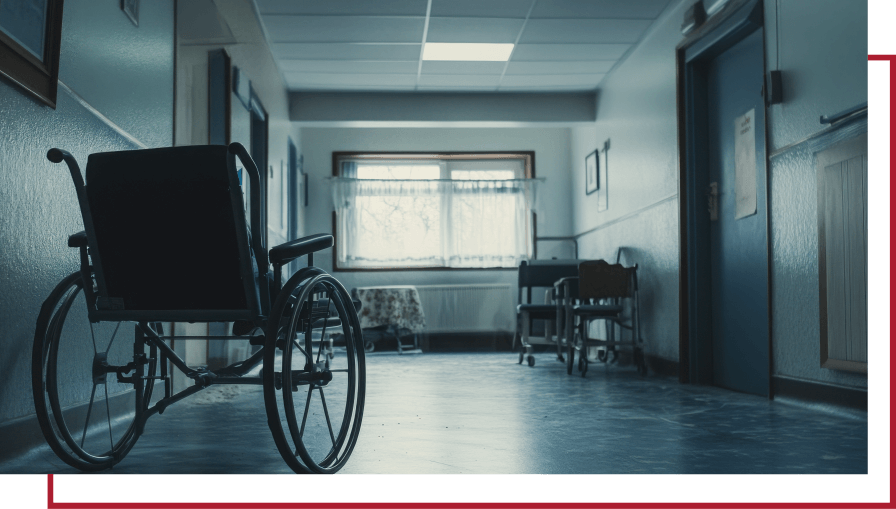
We are in it together

Are You Or A Loved One A Victim Of Nursing Home Abuse? We Can Help.
People can suffer nursing home abuse without reporting it. Yet, the longer nursing home abuse goes unaddressed, the worse the issue can become. For those dealing with nursing home abuse in North Carolina, legal help is available from Ricci Law Firm Injury Lawyers.
Get in touch with our team of nursing home abuse attorneys today. We can review your elder abuse claim and help you determine how to proceed. Our elder abuse attorney will do their part so you can attain a positive outcome.
Navigating the Complexities of Nursing Home Abuse
We represent clients in cases of nursing home abuse, advocating for those harmed by neglect, physical abuse, or emotional mistreatment. Our team works to secure compensation for medical expenses, pain and suffering, and other damages caused by these violations of trust.
Additionally, we investigate third-party liability claims and assist families in navigating the legal process to ensure their loved ones receive justice and the financial support necessary for their recovery and future care.
All Related Practice Areas:
Definition of Nursing Home Abuse in North Carolina

Recognizing and Addressing Physical Abuse in Nursing Homes
- Signs of Abuse: Recurring or unexplained injuries, bruises, or abrasions indicating physical restraint.
- Restricted Access: Medical staff refusing to leave the patient alone with their family.
- Acts of Violence: Care providers kicking, hitting, or causing physical harm to patients.
- Accountability: Abusers and those allowing abuse must be held responsible for their actions.
- Legal Support: An elder abuse lawyer can help stop the abuse and seek justice for the victim.
Research released in June 2022 indicates one in six people age 60 and older has experienced some form of abuse in a community setting in the past year. Those who reside in a nursing home expect the best care and support possible. However, they can be subject to multiple types of abuse, including:
Psychological Abuse
Psychological abuse occurs when one person uses words or non-physical actions to harm someone else. A psychological abuse victim may be the victim of manipulation, to the point where someone else confuses this individual or influences their thoughts and actions. At the same time, the psychological abuser can negatively impact the victim’s mental and emotional well-being.
There are many forms of psychological abuse that a care provider can inflict on a patient. These include:
- Intimidating a patient
- Yelling at a patient
- Insulting a patient
- Ignoring a patient and choosing not to respond to the patient’s concerns, questions, or requests
- Not letting a patient participate in social activities
A psychological abuse victim may be prone to depression and withdrawal from social activities that this individual previously enjoyed. The victim may also experience sudden weight loss, insomnia, and other physical and emotional symptoms. If a person is coping with psychological abuse, a nursing home abuse attorney can help this individual seek justice against anyone responsible for it.
Neglect
Neglect is a major concern in nursing homes across the United States. It occurs when a care provider ignores a patient, to the point where the patient can suffer physical or emotional harm. In addition, neglect is a violation of a duty of care, and a care provider can be severely punished for neglecting a patient.
Common ways in which a care provider neglects a nursing home patient include:
- The care provider leaves the patient alone in their room for several hours at a time.
- The care provider does not give the patient a sufficient amount of food and water.
- The care provider does not treat the patient’s injuries or illnesses properly.
Neglect can have far-flung effects on a nursing home patient. In instances of neglect, a nursing home abuse lawyer can help. The lawyer can review the nursing home patient’s case and help this individual pursue damage against any at-fault parties.
Financial Abuse
Financial abuse occurs when a relative, friend, or care provider steals money or other property from a nursing home patient. In this scenario, the patient may believe someone else is looking out for their best interests or may have no idea they are being robbed. Regardless, financial abuse can leave a nursing home patient in financial ruin.
There are several forms of financial abuse that affect nursing home patients, including:
- Theft of valuables
- Taking control of the patient’s power of attorney
- Using the patient’s cash or credit cards
Nursing home abuse lawyers can help a person put a stop to financial abuse. Initially, a lawyer will take a look at a nursing home patient’s claim and find out who is being financially abusive. At this point, the lawyer will make sure the patient files a lawsuit against any at-fault parties.
What to Do If You Believe Abuse Is Happening in a North Carolina Nursing Home
You or someone you know may be the victim of abuse in a North Carolina nursing home. If abuse is happening, it will not stop on its own. With the right approach to the problem, you can protect yourself and others against nursing home abuse moving forward.
If you are the victim of nursing home abuse or believe it is affecting a family member or friend in a nursing home, you should:
Call 911
Notify the police about suspected nursing home abuse. The police can then investigate your claim and make sure you and anyone else affected receive medical care. Plus, the police can gather information about your claim and verify anyone responsible for the abuse is held accountable.
Look for Signs of Abuse
If you or someone you know starts showing signs of abuse, write down when you see these signs. Keep track of the dates and times you identify signs of abuse. By gathering plenty of information, you may be able to present a strong argument against any at-fault parties down the line.
Collect Evidence
A nursing home may do everything in its power to hide the fact that a patient is being abused. As such, you should collect evidence any time you or someone you know is abused. You can take photographs of injuries, retrieve medical records, and capture other evidence that can be used to validate your nursing home abuse claim.
Reach Out to a Nursing Home Ombudsman
You can connect with a nursing home ombudsman that responds to complaints against nursing home staff. A nursing home ombudsman is in place in every U.S. state. This individual will hear what you have to say, review any evidence you provide, and look into all aspects of your nursing home abuse claim.
Contact a Nursing Home Abuse Lawyer
Elder abuse lawyers can provide you with a wealth of resources to help you address nursing home abuse. You can partner with an elder abuse lawyer that allocates the time, energy, and resources required to review your claim. The lawyer can offer legal tips and guidance so you can build the strongest case possible against a nursing home.
What to Expect When You Contact Elder Abuse Attorneys in North Carolina
A North Carolina nursing home abuse lawyer asks you questions and learns about your claim. Some of the questions the attorney will ask relate to topics such as:
- When the alleged nursing home abuse began
- Who is responsible for the abuse
- Your response to the alleged abuse to date
Your attorney will work with you to establish the care provider responsible for the abuse was required to provide a minimum standard of care. If the care provider breached this duty of care and abused a patient, the patient can seek damages. The patient’s lawyer can then help their client file a lawsuit and request the most damages possible.
Types of Damages You Can Pursue in a North Carolina Nursing Home Abuse Lawsuit
There are two types of compensatory damages you can request in a nursing home abuse lawsuit in North Carolina: economic and non-economic. You can pursue economic damages for quantifiable losses you incur. Comparatively, you can seek non-economic damages for subjective losses.
Common types of damages that people request in nursing home abuse lawsuits include:
- Medical Treatments: You can ask for compensation for the costs of any medical treatments you have received or will require.
- Emotional Distress: You can request damages for insomnia, fear, anxiety, or other forms of emotional distress you suffer.
- Loss of Enjoyment: You can pursue damages for any loss of enjoyment you experience due to any nursing home abuse you incur.
A nursing home abuse lawyer in North Carolina will encourage you to ask for a significant amount of compensatory damages. Once your attorney reviews your case, your lawyer can calculate a reasonable amount of damages to request. From here, your lawyer will make sure you present a legitimate claim for damages that compels a judge or jury to rule in your favor.
Types of Nursing Home Lawsuits You Can File in North Carolina
A nursing home abuse attorney in North Carolina will help you file a lawsuit that aligns with the facts of your case. The lawyer may urge you to pursue damages in any of the following types of lawsuits:
Wrongful Death
Your loved one may receive care and support from nursing home staff. Even though you believe nursing home personnel are helping your loved one, they may be abusing them. If this is the case, nursing home staff members can severely abuse your loved one, resulting in a wrongful death.
A nursing home abuse attorney takes every claim seriously. In a wrongful death case, the lawyer can help you recover a myriad of damages, such as:
- Your loved one’s funeral and burial expenses
- Pain and suffering your loved one incurred before their death
- Loss of companionship
In a wrongful death case, your attorney will attempt to prove that your loved one’s death occurred due to a nursing home staff’s abuse. The lawyer will collect evidence and pursue witnesses that can testify in your case. If the attorney is successful, you may be awarded tens of thousands of dollars in damages.
Negligence
Nursing home personnel may offer a standard of care to a patient but fail to meet it. In this instance, the nursing home is negligent, and a patient can sue. With help from a nursing home abuse attorney, a patient can request damages from any negligent staff at the nursing home and any other at-fault parties.
Breach of Contract
A nursing home has an agreement in place with a patient to provide this individual with a suitable level of care. If nursing home staff breach this contract, the patient affected by it can pursue damages. The patient in this scenario can consult with an attorney to sue the nursing home for the maximum amount of damages possible.
How a North Carolina Nursing Home Abuse Lawsuit Gets Settled Without a Trial
After you file a nursing home abuse lawsuit, a defendant may move quickly to offer a settlement. The defendant may do so in the hopes you will accept a settlement for less money than you originally requested. If you approve the settlement, your case is closed.
Do not rush through the process of reviewing a settlement proposal. Rather, consult with your nursing home abuse lawyer to explore all of the options at your disposal. Remember, when you get a settlement proposal, you can:
- Approve the Offer: This allows you to receive a portion of the damages you initially requested.
- Decline the Offer: This enables you to continue with your litigation and seek full damages.
- Counter the Offer: This gives the defendant the opportunity to accept a settlement that lines up with your expectations.
You may feel pressure to accept a settlement, but you should not approve an agreement unless you are satisfied with it. With help from your attorney, you can examine a settlement offer from all angles. If you are not 100% satisfied with a settlement, you can reject it and continue to move forward with your case.
How the Legal Process Works in a North Carolina Nursing Home Abuse Lawsuit
Do not expect a North Carolina nursing home abuse lawsuit to be settled right away. It can take months or years before your case goes to trial. During this time, your attorney will help you develop a compelling argument.
Here are the steps you will need to complete before your nursing home abuse claim is settled:
Information-Gathering
Before you file your lawsuit, you need information to show a lawyer you have a valid claim. You can present medical records, witness statements, and other information that indicates you or someone you know is the victim of nursing home abuse. Next, your attorney can review this information and help you determine the best course of action.
Filing Your Complaint
You can sue nursing home staff and other at-fault parties in your nursing home abuse lawsuit. After your attorney reviews your claim, this legal professional can help you determine what parties to sue. Your lawyer will make sure your lawsuit is filed against any at-fault parties in accordance with North Carolina’s statute of limitations.
Serving At-Fault Parties
The court will serve papers to anyone involved in your nursing home abuse lawsuit. This gives any at-fault parties the opportunity to respond to your complaint. In some instances, an at-fault party may present a settlement offer after they are served.
Response from At-Fault Parties
It is common for any at-fault parties to deny any nursing home abuse claims you have made against them. They may also argue that you are not entitled to any damages. By partnering with an experienced nursing home abuse lawyer, you are in a great position to dispute allegations from any at-fault parties.
Negotiations
You and the defendant are expected to remain open to negotiations until your case is presented to a judge or jury. The defendant may present multiple settlement offers over the course of your litigation. It is your responsibility to decide whether to accept, reject, or counter any settlement proposals that come your way.
Trial
In a nursing home abuse trial, you and the defendant can present your respective arguments. Your attorney will advocate on your behalf during your trial. Also, your lawyer will present a closing argument designed to compel a judge or jury to provide you with a favorable ruling.
Appeal
There is no telling how a judge or jury will rule in a nursing home abuse case. If you are not awarded damages, you can appeal the court’s decision. Meanwhile, if your appeal is not successful, you will receive no damages.
How to Find the Right Attorney for Your North Carolina Nursing Home Abuse Case
It is beneficial to partner with an attorney that keeps their clients’ best interests top of mind. To choose the right lawyer for your North Carolina nursing home abuse case, you should:
- Identify an attorney who possesses many years of experience with nursing home abuse cases
- Read an attorney’s client reviews to get a firsthand look at how the lawyer supports their clientele
- Meet with the attorney and see how the lawyer responds to your legal concerns or questions
The ideal attorney will instill confidence. This lawyer will do what is required to help you win or settle your nursing home abuse case in as little time as possible. Most importantly, the attorney will communicate and collaborate with you at every stage of your case.
Nursing Home Abuse FAQs
Nursing home abuse claims can be complex, with many legal challenges that may feel overwhelming, especially while dealing with the emotional and physical aftermath of the abuse.
To assist you, we’ve compiled answers to some of the most common questions our clients have about nursing home abuse cases in North Carolina. Read on to understand your rights and explore your options for justice and compensation.

When you think of a whiplash injury, most think about the pain caused by their head being jerked in a new direction against the will during an automobile a...
It can be easy to feel like your personal injury case is taking forever. There seems to be a snag at every turn you take toward a resolution. You can’t help but wonder if there’s a way ...

Get Help from a Nursing Home Abuse Lawyer in North Carolina
Ricci Law Firm Injury Lawyers is here to help you with your nursing home abuse case. We have more than 60 years of experience and go above and beyond to deliver optimal case results. To learn more or request a consultation, please contact us today.


